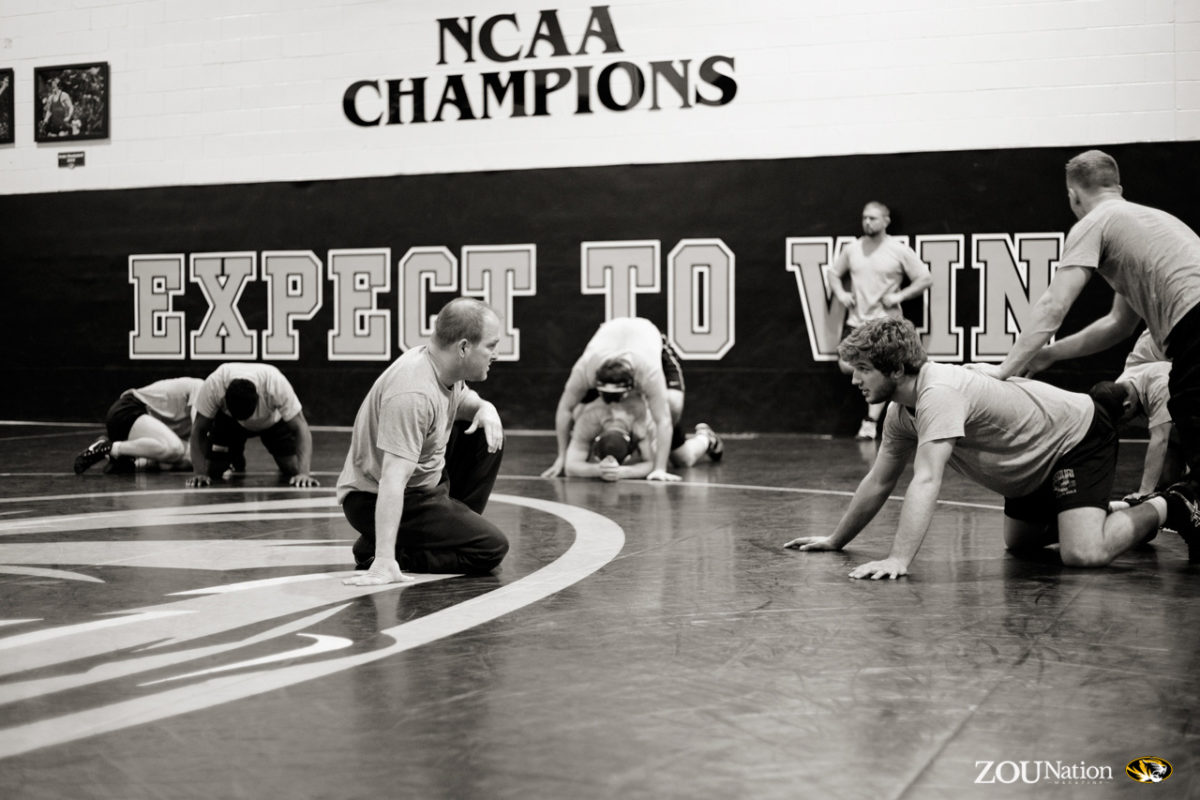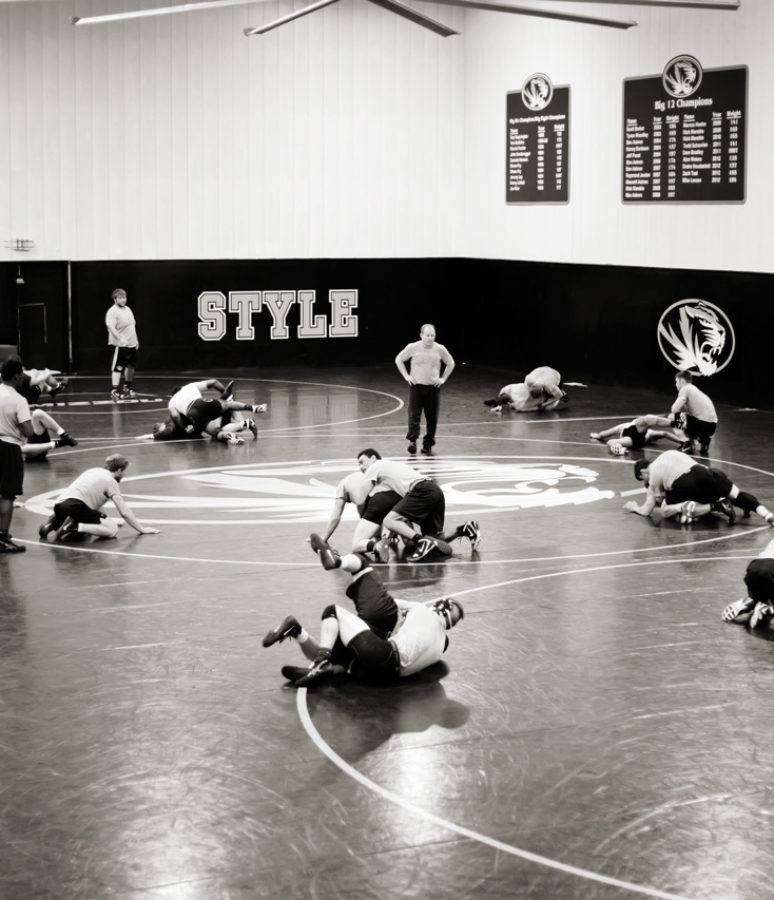It's Not All About Takedowns
How Brian Smith built the Missouri wrestling program into a national powerhouse.
It’s match day, so Brian Smith walks onto the floor of the Hearnes Center to watch his wrestlers take on their opponents. But he can barely hear his own voice over the deafening cheers of the crowd. Every seat in the 13,000-capacity arena is filled. His voice strains as he tries to shout over the roar — he needs to tell his wrestlers to remember one thing and one thing only: follow their team philosophy, Tiger Style. Before he can get the words out, the crowd begins chanting, “Ti-ger-style, Ti-ger-style” — the pace quickening until it matches the frenetic speed of the wrestlers’ heartbeats.
Smith takes a step back. This scene, he explains, is a dream of his.
Since he joined the University of Missouri wrestling team as head coach in 1998, he has transformed the team from an unranked program to a national powerhouse that’s consistently ranked in the Top 10 of Division I wrestling and has produced two Olympic athletes. The team, however, still isn’t drawing sold-out crowds — at least, not yet.
“That day is coming,” Smith says. “And it’s going to happen while I’m here. I really believe it.”
If the past 18 years have taught Smith anything, it’s that when he really believes something, it’s only a matter of time before it happens.
In 1998, Mizzou took a risk hiring the unknown Smith, a 32-year-old at the time, as head coach.
“Mizzou was in the Big 12 at the time, so getting hired was a dream come true,” Smith says. “Of course, now I always tease the administration that after Mizzou moved to the SEC, they took my dream away.”
All jokes aside, in 1998 Smith found himself in a challenging position. He entered a program in need of drastic reform even beyond the mat. At the time, many of the athletes weren’t prioritizing going to class, focusing instead on their social lives, and Smith quickly determined that the culture needed a change.
“I came in and said, ‘We’re going to do all the little things right; we may not be able to beat people yet, but we’ll do the little things right,’ ” he says. “A lot of the guys didn’t have any expectations or think they could be great. I needed to fix that.”
Smith had been training for years to build players up in a sport that revolves around taking players down. At Mizzou, he had the chance to make his greatest impact yet.
Although he now found himself in charge of a Division 1 program, Smith had never intended on becoming a wrestler. As a kid, he had missed lengthy spans of school due to illness — he suffered from asthma and came down with pneumonia seven times. He was small and sickly, but “Little Brian,” as his family called him, stayed active. The Binghamton, New York, native grew up playing basketball and football. In fifth grade, he tried wrestling and he hated it. It wasn’t the fun, mainstream sport he could play with friends.
The self-described “mean point guard” spent most of his free time shooting hoops outside his house, but his dream was to follow in his father’s footsteps: becoming a high school football coach.
But that all changed when Smith was 14. His poor health became so severe that his doctor gave the family an ultimatum: either undergo major lung surgery, or the family could move to a warmer climate in hopes of improving his health. His father had just taken a sales job in New York, but the family decided to relocate to Florida.
Once they had moved, Smith’s dad suggested he give wrestling another shot — if only to help him become stronger for football. This time around, something clicked.
“When I started wrestling, I realized that — more than with any other sport — you accomplish what you put into it,” he says. “And that became the reason I fell in love with it. It became my life.”
Moving to Florida allowed Smith to rediscover wrestling, but ultimately, wrestling was the force that moved him. He went on to become a two-time state wrestling champion in high school, then moved on to Michigan State University, where he was a three-time All-Big Ten wrestler and a four-time letterman.
He had many titles to his name, but Smith never let go of his dream to become a coach. In 1992, he was offered a part-time assistant coaching position at Cornell. He decided to take it after following advice from his favorite coach — his dad.
“My dad said to me, ‘One of my dreams was to be a college or NFL coach. You’re young and single, you can go after this’, ” Smith says. “I thought, i’ll do this for a couple years, and if it doesn’t work i’ll get another high school job.”
He believed. He took the chance and moved. And in the end, he says, belief is something that has carried him through.
After arriving on the college scene, Smith quickly proved himself. At Cornell, he put together two of the nation’s top-10 recruiting classes and helped win two Ivy League Championships as an assistant coach. In 1997, he accepted his first head coaching job at Syracuse at a time when many schools were eliminating their wrestling programs. The satisfaction wasn’t fully there; his dream, after all, was to lead a Big 10 or Big 12 program. He kept pushing further, interviewing for 10 different coaching jobs, including Mizzou’s.
The Missouri program was in rough shape when he arrived, but Smith believed he was the person to turn it around. It took a lot of short steps over a long period of time, but Smith devoted his efforts to recruiting up-and-coming wrestlers who identified with the culture he was creating. That also meant losing the players who didn’t want to be there. The rankings showed the team moving down in the standings, but Smith saw something different: his players grew more confident, building themselves up despite the statistics.
After three or four years of hard work, the program was noticeably different. Smith’s “aha” moment came with Jeremy Spates. The wrestler, who was part of the team in the early 2000s, shouted “Tiger Style” when they broke down the huddle at practice and meets. Spates took the tradition from his high school team in Oklahoma, the Norman Tigers. To them, it was a pump-up cheer. For the Missouri Tigers, it became a way of life.
Tiger Style, Smith says, is a belief; the foundation for everything. Once his players believed they could be successful wrestlers, they could move on to the next level: competition. After they were competitive, they could further progress in Tiger Style to its final step: winning.
“Looking back on where we started, I always encouraged players to do a little bit more, and a little more,” he says. “Over the years, it’s brought us to where we are now.”
The efforts of Smith’s investment in the program have also paid off. The move to the SEC was a challenging one for the Tigers, as Mizzou became the only team in the league with a competitive wrestling program. But Smith never lost sight of his goal, which was to recruit players to join the Tiger family that now competes in the Mid-American Conference.
That effort requires constant hustle. Much of Smith’s job is staying on top of fundraisers and campaigns to raise money for the team. But he doesn’t see it as a dreaded obligation. “I don’t use the term, ‘fundraising’, ”he says. “I use the term ‘people-raising’. ”
By people-raising, he means developing a relationship with others. Whether he’s on a plane, in a store or in his Bible group, he takes every opportunity to invite those around him to watch a wrestling match. It works. His Bible group includes 10-12 people, none of whom were wrestling fans. But all of them recently traveled to Oklahoma State to watch the team.
“People want to believe in a cause,” Smith says. “In general, people will give to a charity not because they want that individual charity to succeed, but because they want that cause to be successful. That’s why I promote Tiger Style. It’s a belief.”
It’s a belief that has carried some of his players to great feats. Mizzou’s program has seen unprecedented success in recent years. Smith has coached 22 All-Americans to 42 top-eight performances, and five Tigers to seven national championships. As the winningest coach in program history, Smith has compiled a 237-92-3 record at Missouri over his 18-season tenure. In the 2014-15 season, the Tigers finished at a perfect 24-0.
These are concrete numbers to measure success. What’s harder to quantify is the level of investment Smith has in each of his wrestlers. He encourages academic excellence, and the wrestlers vie for the Tiger Cup, which signifies achievement in athletics, academics and community involvement. It’s the only male team to have won it in recent years, a fact in which Smith takes pride. Tiger Style factors into their academic success.
He also helps the student-athletes find summer jobs. He reminds them to study hard. And, in special instances, he follows them around the world when they compete on the Olympic stage.
“It’s really the ultimate embodiment of Tiger Style when young men believe in it so much they make the Olympic team like j’den Cox and Ben Askren did,” Smith says. “To be able to compete at the highest level. That’s something else.”
It would also be “something else” to “people-raise” enough that the team is able to draw sold-out crowds to the Hearnes Center.
Smith can see it now. He believes it will happen. He knows it’s only a matter of time.
Photos: Travis Smith



